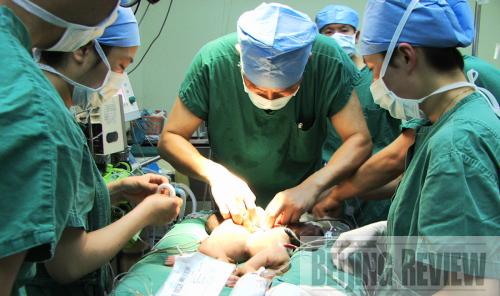|
 |
|
LIFE SAVERS: Doctors at a hospital in Guangzhou, Guangdong Province, operate on Siamese twins in an attempt to separate them on March 10 (ZHOU WENJIE) |
In China, public hospitals are major provider of medical services, which everyone will need at some time. Doctors and nurses in public hospitals work day and night to cure and save ailing people. At the same time, they are exposed to risks of medical disputes, for which they are sometimes not accountable. They deserve the whole nation's respect.
However, the current policy that allows hospitals to make up for their operational deficits with earnings from drug sales negatively impacts on the behavior of medical workers. For the survival and development of the hospitals and also for the sake of their own interests, doctors deliberately use expensive medicines in the treatment process, increasing patients' economic burden. As a result, patients and the public at large gradually lose trust in doctors. Moreover, as a result of the practice of "reversed burden of proof" adopted in settling medical disputes and lawsuits, some doctors choose to conduct redundant physical checkups on patients in hopes of avoiding possible risks and lessening the accountabilities they might have to face. This further damages the way patients view doctors. All these facts have triggered extensive complaints from the public and thus have to be carefully dealt with in the reform.
At the same time, some medical workers are worried that, if the compensation system is not well implemented, public hospitals' role of "public service" provider will damage their immediate interests, and thus they are reluctant to get involved in the reform.
In response to all these problems, the recently published medical reform scheme proposes that the link between hospital's income and drug sales should be cut, saying this is the key to preventing hospitals from selling expensive and unnecessary medicines to patients. This will also help relieve patients of excessive medical costs. Therefore, improving the compensation system for public hospitals and putting into practice relevant policies are crucial for restoring medical workers' dignity, easing the tension between doctors and patients and mobilizing medical workers to actively become part of this reform.
To stimulate medical workers' enthusiasm, we need to push forward the reform of the wage-setting system in public hospitals. In light of regional medical service development programs, there should be rigid quotas for the staff size and bed number in local public hospitals and also for their workers' incomes. It's necessary to reasonably widen the income gap in public hospitals, that is, to offer those who possess key positions or high qualifications bigger salaries. Efforts should also be intensified to set up contractual employment, accountability and merit pay systems, with a view to improving the incentive mechanism in an all-round way. In this way, medical workers' salaries are linked to their duties, work quality and quantity, as well as patients' feedback. Many public hospitals in China have looked at these measures, and the pilot hospitals should carefully draw their conclusions from the initial experience.
To stimulate medical workers' enthusiasm, it's necessary to make better use of human resources. Apart from the implementation of the contractual employment system, it's also important to increase the mobility of medical talent by giving them certain freedom to operate in more than one hospital. Medical workers' should be encouraged to bring into full play their specialties by improving their working method. It's important to allow medical workers' technical and labor contribution to be rewarded in economic terms through improving the compensation system for public hospitals and reforming the current wage-setting system. This will encourage medical workers to participate in the reform.
What is the relationship between improving the management of public hospitals and maintaining public hospitals' nonprofit nature and stimulating medical workers' enthusiasm?
The management of public hospitals covers both internal and external management. By the external management, we refer to the relationship between the government, which is the owner of public hospitals, and hospital managers. By the internal management, we refer to public hospitals' institutions for decision-making, daily operation and self-supervision. The core of public hospital management is how to make the managers work for the owner's aim of public welfare. Here, sound internal institutions will help public hospitals to maintain their nonprofit nature.
In conclusion, while carrying out the reform of public hospitals, their role as public service providers should never be changed. For this purpose, a sound compensation system should be established and relevant policies should be thoroughly implemented. Besides this, encouraging medical workers to get involved in the reform is the fundamental guarantee for more effective medical services, and improving the management of public hospitals serves as an institutional guarantee for their nonprofit nature and the mobilization of medical workers' enthusiasm. |
